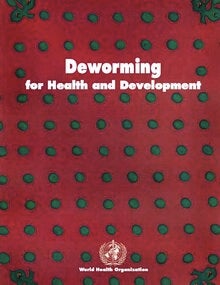Resolution
Resolution of the Third Global Meeting of the Partners for Parasite Control, WHO, Geneva, 29-30 November 2004 The partners agree that while worm-induced disease may not have such an obvious impact on the well-being of people as Tuberculosis (TB), malaria and human immunodeficiency virus/acquired immunodeficiency syndrome (HIV/AIDS), it is nevertheless a relentless drain on the health, development, education and economy of socially-marginalized poor people in low-income countries. The partners PROPOSE that the control of parasitic worm infections (cestodiasis, dracunculiasis, lymphatic filariasis, onchocerciasis, schistosomiasis, soil-transmitted helminthiasis, strongyloidiasis and trematodiasis) should be effectively incorporated into a multidisease control approach together with TB, malaria and HIV/AIDS. This strategy will contribute significantly to the attainment of most of the eight MDGs. In fact, without action to control worm-induced disease, measures to bring relief from TB, malaria and HIV/AIDS are incomplete and may be compromised.
|

